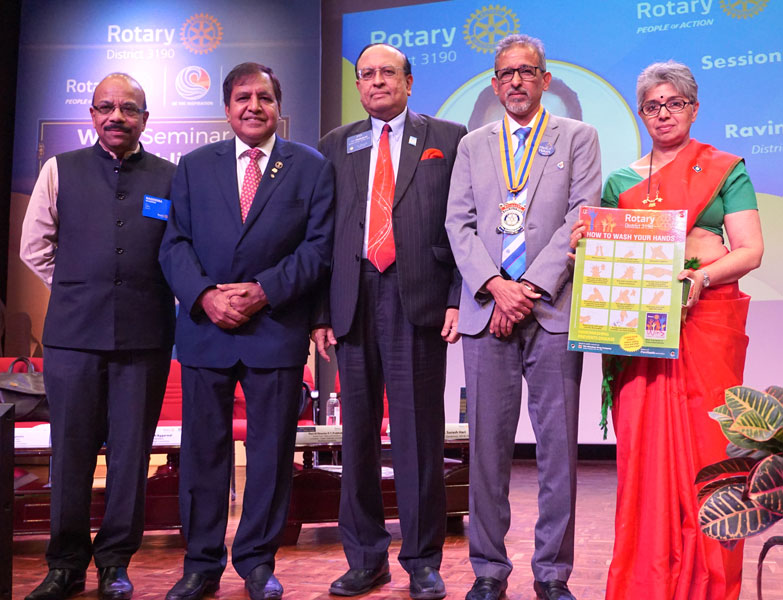Addressing a WinS seminar recently in Bengaluru, PRID P T Prabhakar, Global Chairman for WinS, said, “I will not be surprised if Sushil Gupta in his presidential year (2020-21) inspires Rotarians around the world to take up WinS as a global project.” The WinS Target Challenge currently brings together Rotarians from Belize, Guatemala, Honduras, India and Kenya to improve water, sanitation and hygiene education to children.

Prabhakar asked, “Very often we talk about ‘What after Polio?’ WinS could be the next big activity for Rotary. So, in a district where you run major projects like the Rotary TTK Blood Bank and Karunashraya, the hospice that takes care of the terminally ill, I am sure a simple programme like WinS will be easy to implement.”
But WinS is more than just building toilets; it is about “developing India”.
Why WinS?
Responding to a question ‘Why a club should choose a WinS project’, quoting UN statistcs, he said India ranked below Pakistan and Bangladesh in the human development index, primarily because of lack of toilets leading to open defecation. “Worldwide 61 million children are stunted because they are exposed to human waste, 33 per cent of whom are from India.” If children washed their hands before a meal and after using the toilet, diarrhoeal deaths can come down by 44 per cent, he added.
WinS is not an expensive project. “A handwash station costs just ₹15,000.” Clubs could also apply for global grants as up to $1.5 million is available through TRF. “Districts 3211 and 3131 received $20,000 each last year. Find a partner and apply for a GG,” Prabhakar suggested, and urged the clubs to build gender-segregated toilets and focus on menstrual health management.
Referring to instances where clubs enthusiastically start menstrual hygiene management in schools, “distributing sanitary pads, installing vending machines and incinerators, but after three months everything is discontinued,” he highlighted the idea suggested by Dr Meenakshi Bharat, member of RC Bangalore West, RID 3190, to donate reusable pads that last for 2–3 years. “These have no chemicals, are environment-friendly and cost ₹200. Imagine the good you will be doing to the environment, while helping an underprivileged girl.”
A poster illustrating handwash techniques was released in English and Kannada followed by Wins Committee Member PDG Ramesh Aggarwal giving the participants details on what exactly Target Challenge involved.
DG Suresh Hari committed to implement WinS in 150 schools in the district.
Making menstruation more manageable
According to the World Bank, in India, over 113 million adolescent girls are at risk of dropping out of school because of lack of toilets and the stigma attached to menstruation, said Dr Meenakshi Bharat, a gynaecologist. “Periods are considered a problem on so many fronts. They are huge contributors to waste, keep girls away from school, and hinder the activities in women.”
Her club has been working on garbage management in Bengaluru since 2009. The wet waste gets composted and is used in terrace gardens as a fertiliser. Single-use sanitary napkins pose a major challenge, she pointed out, suggesting the use of a menstrual cup as an alternative to disposable sanitary napkins. Made of medical-grade silicone, each cup lasts up to 10 years. On an average, a woman uses about 5,000 disposable sanitary products in the same time span, “the cup is more economical and eco-friendly. I can’t think of anything more reusable; simply wash and use again. This is most suitable for girls above 18. A single investment of ₹1,000 can give you a no rash, no cash, no trash menstrual cycle,” she said.
Due to the high cost of a sanitary pad, most girls from underprivileged families wear a single sanitary pad for a long duration, compromising on health.
The cup makes periods very comfortable. “You can do Zumba, swim or trek. It’s time as women we revisit the option to make our periods more manageable. We hope to reach out to more women,” said Meenakshi.





